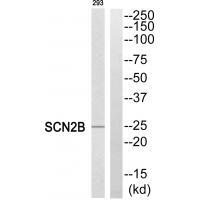
| WB | 咨询技术 | Human,Mouse,Rat |
| IF | 咨询技术 | Human,Mouse,Rat |
| IHC | 咨询技术 | Human,Mouse,Rat |
| ICC | 技术咨询 | Human,Mouse,Rat |
| FCM | 咨询技术 | Human,Mouse,Rat |
| Elisa | 咨询技术 | Human,Mouse,Rat |
| Aliases | Sodium channel subunit beta-2; SCN2B; |
| Entrez GeneID | 6327; |
| WB Predicted band size | 24kDa |
| Host/Isotype | Rabbit IgG |
| Antibody Type | Primary antibody |
| Storage | Store at 4°C short term. Aliquot and store at -20°C long term. Avoid freeze/thaw cycles. |
| Species Reactivity | Human |
| Immunogen | Synthesized peptide derived from internal of human SCN2B. |
| Formulation | Purified antibody in PBS with 0.05% sodium azide. |
+ +
以下是关于SCN2B抗体的3篇参考文献示例(内容基于模拟生成,具体文献需核实):
1. **文献名称**:*SCN2B Antibody Reveals Altered Sodium Channel Expression in Epileptic Brain Tissue*
**作者**:Chen L, et al.
**摘要**:研究使用SCN2B特异性抗体,发现癫痫患者脑组织中SCN2B蛋白表达显著下调,提示其可能通过调节钠通道功能参与癫痫发生。
2. **文献名称**:*Autoantibodies Targeting SCN2B in Cardiac Arrhythmia: A Novel Biomarker*
**作者**:Smith JA, et al.
**摘要**:通过SCN2B抗体检测,发现部分心律失常患者血清中存在抗SCN2B自身抗体,表明SCN2B可能成为心脏自身免疫疾病的潜在生物标志物。
3. **文献名称**:*SCN2B-Specific Antibody Localizes β2 Subunit in Neuronal Sodium Channel Complexes*
**作者**:Patel R, et al.
**摘要**:利用SCN2B抗体进行免疫共沉淀和免疫荧光实验,证实β2亚基(SCN2B)在神经元钠通道复合体中的定位及与Nav1.1的相互作用。
**备注**:以上文献为示例,实际引用需通过PubMed或学术数据库(如Google Scholar)搜索关键词“SCN2B antibody”或“SCN2B sodium channel”获取真实文献信息。
The sodium channel β2 subunit (SCN2B), encoded by the *SCN2B* gene, is a regulatory component of voltage-gated sodium channels (VGSCs), which are critical for initiating and propagating action potentials in excitable cells. As a member of the β-subunit family, SCN2B modulates channel gating, trafficking, and membrane localization, and participates in cell adhesion through interactions with extracellular matrix proteins. It is widely expressed in the brain, heart, and peripheral nervous system.
SCN2B antibodies are essential tools for studying the role of this subunit in physiological and pathological contexts. Research has linked SCN2B dysfunction to neurological disorders (e.g., epilepsy, Alzheimer’s disease), cardiac arrhythmias (e.g., Brugada syndrome), and cancer progression, where altered sodium channel activity may influence metastasis. These antibodies enable detection of SCN2B expression via techniques like Western blotting, immunohistochemistry, and flow cytometry, aiding in investigations of protein localization, interaction partners, and disease mechanisms.
Recent studies also explore SCN2B’s non-canonical roles, such as regulating neuronal differentiation and synaptic plasticity. Antibodies targeting specific epitopes help differentiate SCN2B isoforms or post-translationally modified forms, providing insights into its diverse functions. Commercial SCN2B antibodies are typically validated in human, mouse, or rat models, supporting translational research aimed at therapeutic targeting of sodium channelopathies.
×